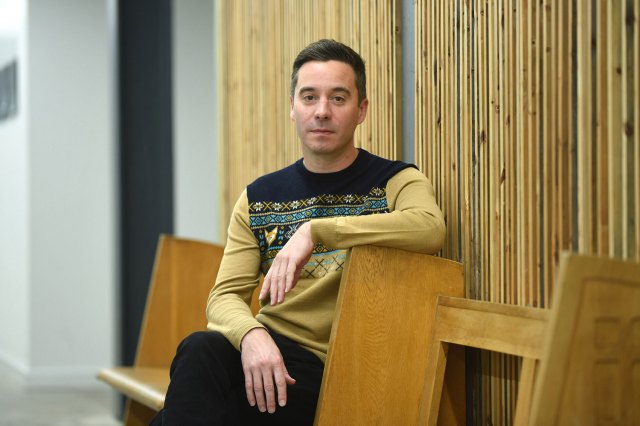James Graham: I’m a playwright because of arts education, but we’ve lost thousands of drama teachers
Graham mourns the continued decline of arts in education

Playwright James Graham has two shows basically playing next door to one another (not for the first time!) at the moment – with Gareth Southgate drama Dear England returning to the National Theatre, and Punch playing at the Young Vic following a world premiere at Nottingham Playhouse.
Graham’s next play Make It Happen, announced earlier this year, will star Succession’s Brian Cox at the Edinburgh International Festival and be about the financial crash of 2008.
But beyond what is happening on stage, Graham is keenly aware of growing societal issues both within and beyond the arts – as discussed on the WhatsOnStage Podcast on Friday.
Listen to the interview for free here:
Graham has, relentlessly, spoken out against the relentless cuts to arts in education in the UK: “The reason why I’m a playwright is because of arts education and it’s now gone. That’s not even an opinion – it’s statistically true. You can measure it. We’ve lost thousands of drama teachers and the hours given to creativity in schools has been reduced radically.”
The situation doesn’t just affect arts and creativity – but wider themes of connection and community, especially within the context of social media and a rise in toxic content online: “Thinking about the conversation we’re having right now thanks to another great playwright, Jack Thorne, who’s just co-written Adolescence on Netflix, we can’t forge authentic and empathetic connections between young men because there aren’t the places to do that anymore. They’re forged on the football pitches, or in the youth centres, but because our public realm has been dismantled, then the only place left is the classroom.
“Yes, I know reading and numeracy are important, but if for a couple of hours a week we could just get young men together in a Gareth Southgate way to walk in the shoes of someone else, by telling a story, or trying to empathise with something beyond them: I just think that it makes a world of difference. A drama can’t fix everything, but it can help.”
The arts play a fundamental role in teaching empathy to young people – in a time where that is more important than ever: “It’s not about every single person having to become a playwright or an actor. It’s about what the act of exploring an anxiety through construction, through imagining yourself into someone else’s circumstances, can do. It’s a tool and you can lose the ability to use that tool if you don’t do it. Hence why the horror show that is social media is not a tool that encourages you to generously – and in good faith – imagine yourself into someone’s circumstances.”

Graham also lamented the lack of pathways for aspiring playwrights in the UK – with doors constantly closing to new talent: “I’m also painfully aware of the limited amount of access and opportunities that the next generation of playwrights are getting. I think my path has basically disappeared. I began writing plays at the Finborough Theatre, a 50-seat pub theatre. No one paid me but I did it. I would work in the day and write in the evening. I got a play on there pretty much once a year for five years, for which I was really relieved: I didn’t have that big star debut that some people have – I needed time to really learn without too much pressure.”
A part of this has been the decline of literary departments in major venues, with Graham saying he “gratefully received support from any number of literary managers, a role which seems to be vanishing. And artistic directors – even that role is seemingly vanishing in some theatres. I don’t know how young writers get there anymore. The collapse of the Vaults Festival is worrying.”
Punch will transfer to Broadway later this year, while Dear England will head out across the nation after its National Theatre and Lowry seasons. Make It Happen will begin performances in Edinburgh in late July.


















